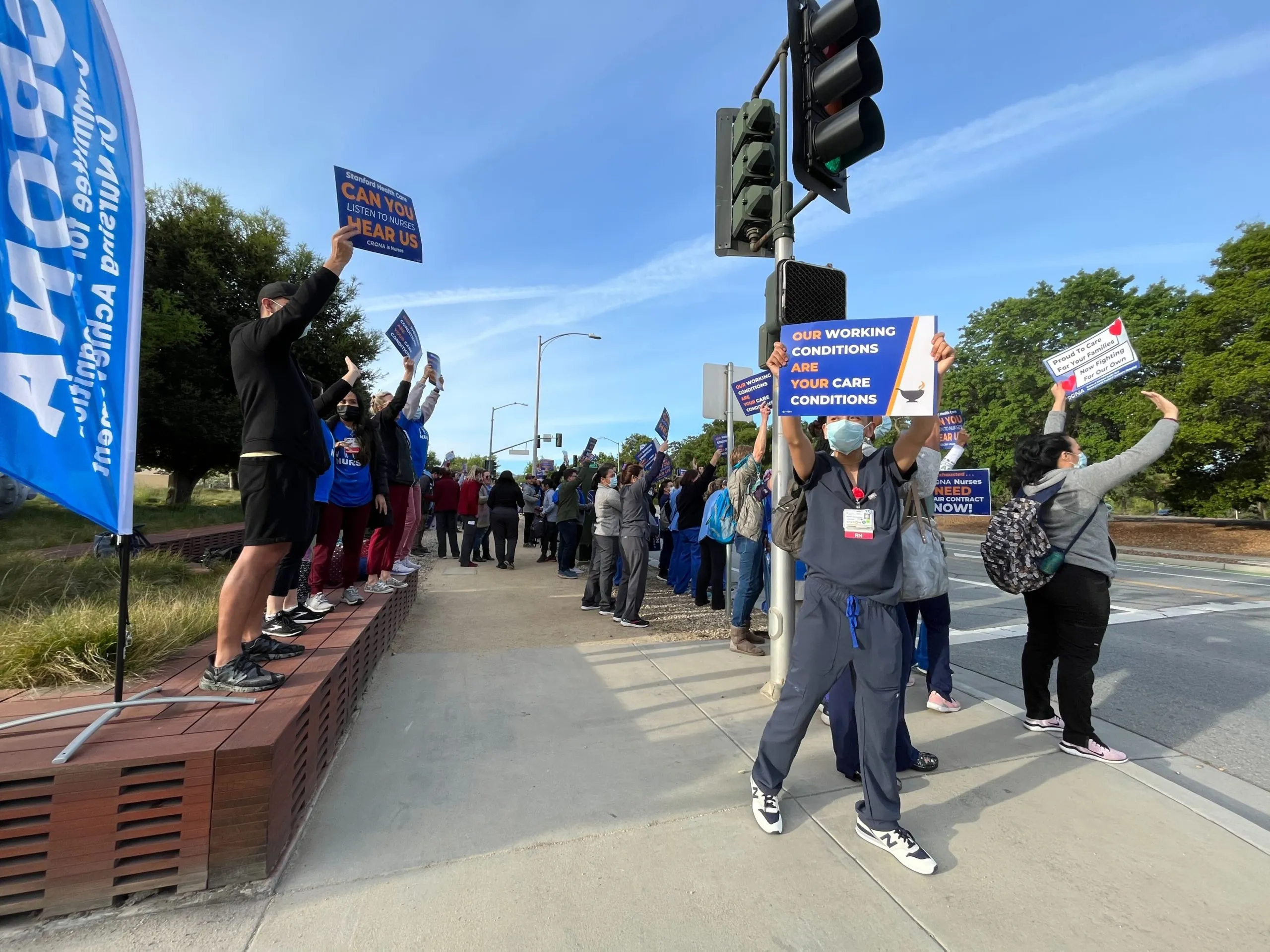Members of the Committee for Recognition of Nursing Achievement (CRONA) will vote on whether to strike Stanford Hospital and Lucile Packard Children’s Hospital on April 7, according to an update on the CRONA website.
Stanford nurses rallied outside of the Stanford University Medical Center on Monday morning to call for a resolution to negotiations ahead of the vote following the expiration of their previous nursing contracts on Thursday.
The strike vote and rally come after over two months of negotiations between CRONA, Stanford Hospital and Lucile Packard Children’s Hospital. CRONA members, who represent nearly 5,000 nurses across both hospitals, have adamantly pushed for the improvement of several workers’ rights, including increased mental health support and protections against workplace violence. CRONA organized a similar demonstration last month in an effort to galvanize negotiations ahead of the contract expiration date.
“We don’t want to go on strike, but we also want to be treated fairly,” Stanford registered nurse Brittany West said during the rally.
While Stanford Health Care remains optimistic that a strike can be avoided, hospitals have taken “precautionary and responsible steps” to continue delivering “safe, high-quality care” to patients, wrote Stanford Medicine spokesperson Julie Greicius in a statement to The Daily.
Despite a potential strike, CRONA remains committed to negotiating amid the contract expiration. “We’re willing to move on some issues if they’re willing to move on some issues,” West said.
CRONA Vice President and Stanford registered nurse Kathy Stormberg also underscored the union’s willingness to “keep going back to the table.” A federally mediated session was held after the rally between CRONA and Stanford Health Care to help both sides come closer to a resolution.
West said she hopes that the negotiation process sheds light on the importance of taking care of nurses, especially given nurses’ own passion for taking care of the community.
Nurses say there is a disconnect between CRONA and Stanford Health Care, and it is an ongoing issue, according to West. Stanford Health Care’s refusal to budge on key nursing demands remains a common grievance for nurses, such as West.
According to Greicius, Stanford Hospital and Lucile Packard Children’s Hospital “remain committed to good-faith bargaining with CRONA to reach new contract agreements.” Among Stanford Health Care’s current proposals, according to Greicius, are those that would “provide nurses with market-leading wages” and further the hospitals’ “commitment to enhanced nurse staffing, workplace safety and wellness,” Greicius wrote.
Still, CRONA and Stanford Health Care remain far from compromise. Mental health support and increased time off, for example, are key components of CRONA’s campaign. Hospitals across the country have dealt with nursing shortages during the pandemic, shortages which have, in many cases, taken a toll on the physical and mental health of the remaining providers. Staffing, however, is one issue that Stanford Health Care has been reluctant to shift its position on, according to Stormberg.
“What we really want to see from them is some acknowledgment that we do have staffing issues,” Stormberg said. “Relying on us to continue to come and work overtime for them is not making our career sustainable.”
Greicius wrote that Stanford Health Care’s hospitals are “proud” of their current staffing plans and grids, which ensure they “meet or exceed state minimums at all times.” These plans and grids, coupled with nursing support, have allowed hospitals to “deliver on their promises of excellent patient care,” she added.
To Stanford registered ICU nurse Bonnie Dalfour, both the strike vote and Monday’s rally represent a need for a rapid resolution to negotiations. A protracted labor dispute would be “awful for both sides,” Dalfour said, especially given nurses’ evident exhaustion from work.
“We got to fix the problems,” she said. “Just not addressing it doesn’t make it go away.”
This article has been updated with correct titles for Lucile Packard Children’s Hospital and Stanford Medicine spokesperson Julie Greicius. The Daily regrets this error.
